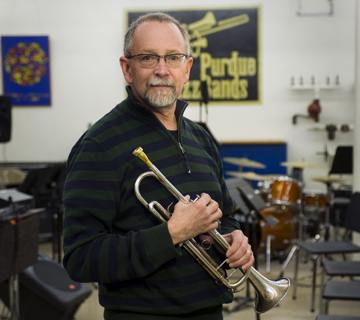Purdue Profiles: Mo Trout

Mo Trout, associate professor of bands and director of Purdue's jazz bands. (Purdue University photo/Mark Simons)
Background music becomes much more than a gentle hum or company-keeper for Mo Trout. No matter if he is at a party, working or in the car, music becomes his focus. A good melody, harmony or cadence has the power to transport this associate professor of bands and director of Purdue's jazz bands to places he has never been before, especially if he is driving. "I have to listen to talk radio in the car or else I'll end up somewhere I wasn't intending to go," he says. "I can't help but get lost in the music."
What initially drew you to music?
Other than my parents playing a lot of records and making me take piano lessons, I didn’t come from a particularly musical family. But I remember in fifth grade my mother came home with an old bugle and clarinet from my grandmother's house. I had just joined Boy Scouts, so when I saw that bugle, I thought, "Cool! I'll learn to be the bugler!" My dad was in the military and sang me bugle calls so I could learn.
Then before I went to junior high, the high school band director brought in instruments for us to try out. I picked up a trumpet, started playing bugle calls and the band director came to me and said, "You're going to be in the band."
And somehow, once I started playing, I just couldn’t stop.
Did you ever think you would make a career out of your love for music?
By the time I was a sophomore in high school, I knew music is what I had to do. I never thought jazz would be such a big part of my job, though. Honestly, I thought I'd be an orchestral trumpet player and do a little jazz on the side, but I was in an orchestra for a while in Sacramento, and it wasn't for me.
In addition to teaching jazz courses and directing the jazz bands, you organize the Purdue Jazz Festival. What should people know about it?
This is the 21st annual educational jazz festival at Purdue. We have students from 93 middle and high schools performing and competing next weekend. It's a really fun event focusing on big band jazz and smaller jazz combos. We also have special guest performances from some well-known jazz artists.
On Saturday, January 22, students will perform on seven stages and all of those concerts are free and open to the public. We've always gotten a really great response from the community, so we try to make as many aspects of the festival as accessible as possible.
What is your favorite part of your job?
Any time I'm working with one of my bands -- Purdue Jazz Band, the American Music Repertory Ensemble, Lab Band and Concert Jazz Band. I really enjoy the students. It's great when students keep in touch after all these years. They call or e-mail just to tell me about a new album or concert they've been to.
It's so great to hear that they are still excited about music because that's one thing we really stress -- a lifelong participation in the arts. We don’t just want students burying their instruments in the closet. We want them to keep playing or at least listening and participating as an educated audience member.
What do you mean by "educated audience member"?
Music provides a really great learning opportunity, but sometimes you have to be willing to do some work and hear things from a different perspective. With jazz, for instance, it can become pretty esoteric, so if you don’t have a background in it, it can just sound like noise.
Sometimes with the bands, we'll play an older swing tune and some students aren’t familiar with that genre, so they don’t know what to do with it. They have to go listen to some music from that time period, research who wrote the song, why they wrote it and who they wrote it for. Learning the history of an unfamiliar piece can help people understand and appreciate different types of music.
Why is music important to many people?
It's cliché, but music is the most universal language. People all over the world listen to music. It's just part of who we are. I'm not sure why that is, but as a species, we organize everything and music is nothing but organized sound. Of course, people organize things differently, so it's very satisfying when you find sounds organized in a way that speaks to you.
For more information about the Purdue Jazz Festival, visit www.purdue.edu/bands/jazzfest/Welcome.html. The festival runs Thursday evening through Sunday.
